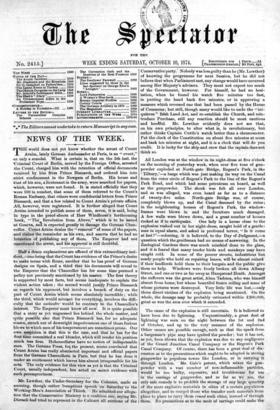Half a dozen explanations are offered of this extraordinary inci-
dent,—one being that the Count has evidence of the Prince's desire to make terms with Rome, another that he has proof of German designs on Spain, and a third that his documents will reveal to the Emperor that the Chancellor has for some time pursued a -policy not previously sanctioned by his master. The first theory is supported by most facts, but seems inadequate to explain the violent action taken ; the second would justify Prince Bismarck as regards his opponent, but involves a breach of duty on the part of Count Arnim which seems absolutely incredible ;• while the third, which would account for everything, involves the diffi- culty that the esclandre would be contrary to the Chancellor's interest. The Emperor must know all now. It is quite possible that a story as yet unguessed lies behind the whole matter, and -quite possible also that Prince Bismarck' has, for no adequate reason, struck out of downright imperiousness one of those furious blows to which men of his temperament are sometimes prone. Our -own suspicion is that this is the case, and that he has for the first time committed a real blunder, which will render his position much less firm. IIohenzollerns have no notion of indispensable men. The German Press, 52% the present, seems convinced that Count Arnim has really abstracted important and official papers from the German Chancellerie in Paris, but that he has done it under an excitement which leaves him almost irresponsible for his acts. The only evidence for this view as yet is that the Criminal Court, usually independent, has acted on secret evidence with such peremptoriness.






































